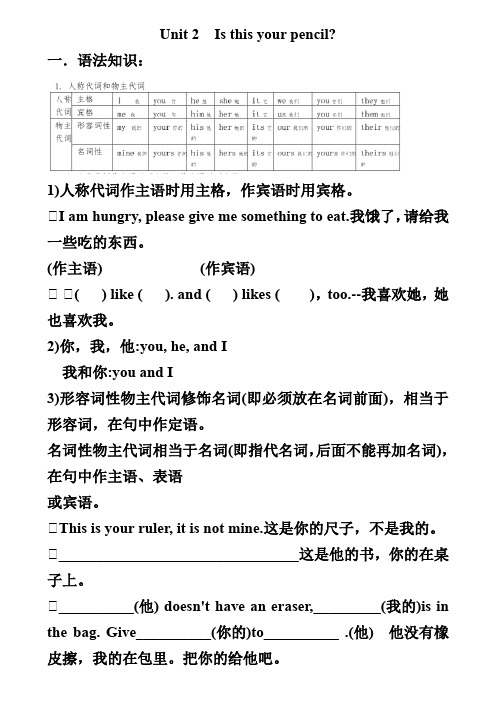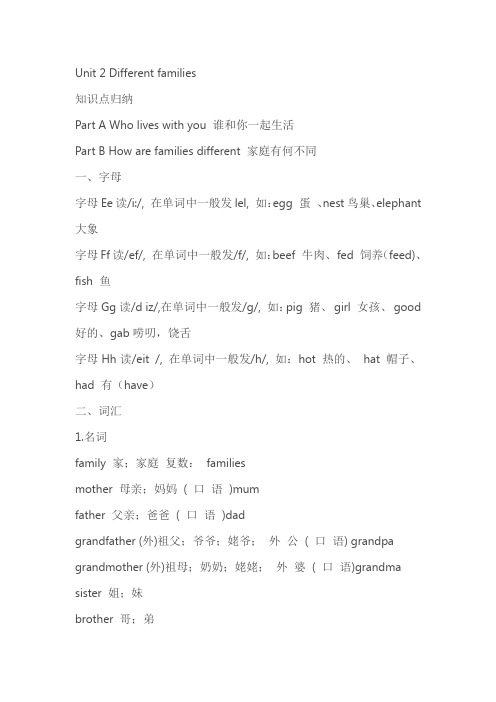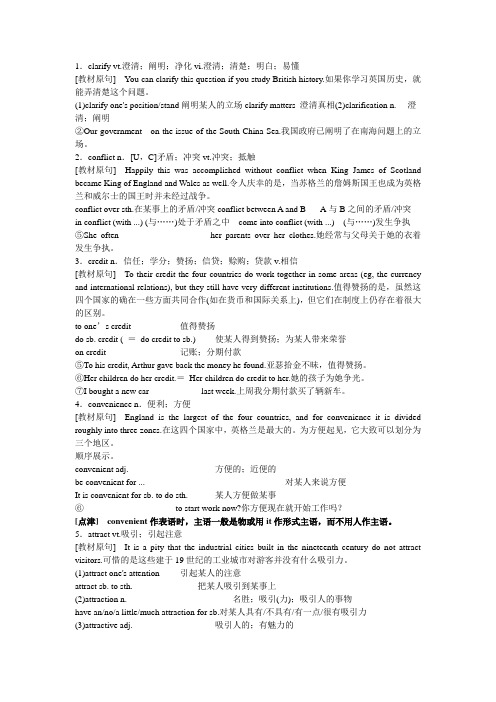Unit 2知识点
Unit 2 知识点提要

8A Unit 2 知识点提要一、词汇1.广告可n. advertisement ▲(an/-s)2.英国的adj. British3.美国的adj. American4.饼干可n. <英> biscuit (a/-s)、<美> cookie (a/-s)5.卡车可n. <英>*lorry ▲(a/lorries)、<美> truck (a/-s)6.橡皮可n. <英> rubber (a/-s)、<美>eraser ▲(an/-s)7.足球可n. <英> football (a/-s)、<美> *soccer (a/-s)8.假期可n. <英> holiday (a/-s)、<美> vacation (a/-s)9.秋天可n. <英> autumn (a/-s)、<美> fall (a/-s)下落;跌倒;倒塌↓v. fall→三单:-s →▲过去式:fell →▲现分:-ing10.商店可n. <英> shop (a/-s)、<美> store (a/-s)11.院子可n. <英> garden (a/-s)、<美> y ard (a/-s)12.电影可n. <英> film (a/-s)、<美> movie (a/-s)[典型例题]( ) 1. People in the UK say biscuit while people in the USA say ______.A. cakeB.cookieC.eraserD.soccer( ) 2. Which sentence is likely (可能) to be spoken by Americans?A. David Beckham is a popular soccer star.B. The shop sells different kinds of biscuits.C. It doesn’t rain often in this city in autumn.D. The film is very popular.( ) 3. If you are an Englishman, you may say “__________ ”A.I want some cookies.B. Autumn is coming.C. Can I borrow your eraser?D. He often plays soccer with his friends.13.男女混合的,混合的adj. *mixed★一所混合学校a mixed school混合v.8AU4mix →▲三单:-es →过去式:-ed →现分:-ing把A与B混合mix A with B把...混合在一起8AU4mix ... together14.法语不可n. &法国人可n.(a/-s) &法国(人)的adj.8BU4French法国可n. France (a/-s) 常用单数15.外国的adj. foreign (not in or from your own country)外国人可n. foreigner (a/-s)16.语言可n. language (a/-s) (words used in speaking and writing)区分:青少年可n. *teenager (a/-s)17.在…期间prep. during18.讨论,议论v. discuss (talk about something)→▲三单:-es →过去式:-ed →现分:-ing★与某人讨论某事discuss sth. with sb.讨论可n.8BU5 discussion (a/-s)19.在课堂上(短语)in class20.<口>家伙可n. *guy (a/-s)21.<口>好朋友;搭档可n.*buddy ▲(a/buddies)22.主动提出,自愿给予v. offer (give something to someone)→三单:-s →过去式:-ed →现分:-ing★为某人提供某物(2种)offer sth. to sb.= offer sb. sth.★给某人某物(2种)give sth. to sb.= give sb. sth.23.结束v. end →三单:-s →过去式:-ed →现分:-ing终止;末尾;终点可n.7BU8end (a/-s)24.棒球可n. baseball (a/-s)25.赢得;赢,获胜v. win (be best or first in a competition)→三单:-s →▲过去式:won →▲现分:winning获胜者可n. winner (a/-s)26.最少的;最小的adj. (little的最高级) least27.至少,不少于(短语)at least28.至多,不超过(短语)at most29.较远(的)/更远(的) adj.&adv. (far的比较级) farther/further★further常考固搭(5种)进一步学习/研究further study/ research 进一步讨论further discussion更多的信息further information 其他的问题further questions再往前/下走8BU3further on/ down30.最远(的) adj.&adv. (far的最高级) farthest/furthest31.花费(时间或金钱) v. spend →三单:-s →▲过去式:spent →现分:-ing★★★★★“花费”公式(4种)It/事takes/took sb. 时间段to do sth.人spend(s)/spent时间段/金钱on sth.(in) doing sth.人pay(s)/paid(金钱)for sth.物cost(s)/cost sb. 金钱(A.takes; spendsB. takes; costsC. costs; costsD. spends; takes( )2. [基础题]The trip to the zoo _______ us about one hour by underground yesterday.A. paidB. tookC. spentD. cost( )3. [易错题]This dress is too expensive, it ____ me 2000 yuan.A.takesB. spendsC. paysD. costs( )4. [难题]He tries to spend as much time as he can ____ computer games.A. playB. playsC. playingD.to play32.制服可n. *uniform ★(a/-s)穿校服wear a school uniform= wear school uniforms33.国际象棋不可n. chess34.每日的,日常的adj.&日报n. daily35.每周的adj. weekly36.快的adj. quick 比较级:-er 最高级:the -est快地adv. quickly比较级:more ~ 最高级:the most ~慢的adj. slow 比较级:-er 最高级:the -est慢地adv. slowly比较级:more ~ 最高级:the most ~37.自始至终,从头到尾&(内部)穿过7BU6 prep. th r ough区分:though/although prep. 尽管thought v. 认为(think的过去式)38.浏览,快速查看(短语)look through39.真实的,真的adj. real真实地;确实,的确adv. really40.起初,首先(短语)at first41.继续/重复做某事(短语)keep (on) doing sth.[拓展] “继续做某事”(4种)keep (on) doing sth.= continue doing sth.= carry on doing sth. = carry on with sth.42.完成;结束v. finish →▲三单:-es →过去式:-ed →现分:-ing★完成做某事finish doing sth.43.午餐时间不可n. lunchtime★在午餐时间at lunchtime44.物理(学) 不可n. physicsPhysics _______ (be) a useful subject, the student must learn it wisely and well.45.羽毛球运动不可n. *badminton[总结] ★★★常考冠词题play+球类、棋、牌、中国乐器 e.g. play baseball/badminton/chess/cards/erhu(二胡) play the+西洋乐器 e.g. play the piano/violin/guitar/drums(鼓)46.理想的adj. *ideal★一所理想的学校an ideal school区分:想法,主意,思想可n. idea▲(an/-s)二、语言点1.(某人)为什么不做某事Why don’t/doesn’t/didn’t sb do sth. =why not do sth.2.like作动词意为“喜欢”,作介词意为“像”(无时态、人称、数的变化)be like 像;look like 看起来像像做某事be like doing sth.—What is your school life like?—It is like _______ (live) in a big garden.( ). Tom, _____ his brother, _____ playing basketball after school.A.like; likesB. like; likeC. likes; likesD. likes; like3.little “几乎没有”,修饰不可n. a little “有一些”,修饰不可n.few “几乎没有”,修饰可n.复 a few“有一些”,修饰可n.复4.你想要做某事吗?Would you like to do sth. ?肯定回答:Yes, I’d like/love to. 否定回答:I’d like/love to, but……5.做某事玩得开心have a good/great/nice/lovely/wonderful/fantastic time doing sth.有很多much/lots of/a lot of没有have no有更多时间做某事more time to do sth.有更少less有一段some time[典型例题]( )1. —Hey, guys. Do you often have a good time _____ after-school activities?—Of course, we do. And we always have a lot of time_____ soccer.A. to do; to practiseB. doing; to practiseC. to do; practisingD. doing; practising( )2.Amy had a lovely time ____ one place after another in Shanghai and she had much time _____ the city.A. to visit; to enjoyB. visiting; to enjoyC. to visit; enjoyingD. visiting; enjoying( )3.Linda had a great time ____ with her friends, and they also had some time ____ about their studies last weekend.A.to talk; to talkB. to talk; talkingC. talking; to talkD. talking; talking6.练习做某事practice doing sth.( )1. My brother enjoys __________ the piano in the music room.A.practice playingB. practice playC. practicing playingD. practice to play( )2. The two girls always have a good time ________ the piano together.A.practice to play B.to practice to play C.to practice playing D.practicing playing( )3. [难题]We should spend as much time as we can __________ English every day.A. practice speakingB. practice to speakC. on practicing speakingD. practicing speaking7.给某人买某物buy sth. for sb.= buy sb. sth.8.在几年级(2种)in Year/Grade+基数词= in the+序数词+year/gradee.g. 在八年级______________________= ______________________(思考:如果改用阿拉伯数字呢?)9.单个动名词作主语,谓语动词用单数As we all know, using public chopsticks ________ (be) necessary when we eat with others.10.“借”(3种)borrow/borrowed 借入borrow sth. from sb.从某人那借来某物lend/lent 借出lend sth. to sb.= lend sb. sth.把某物借给某人keep/kept 借用keep sth. for+时间段借用某物一段时间How long提问①(for)+时间段①since +时间点①since 从句How soon提问in +时间段How far提问路程①实际距离 e.g.500 metres①s’ walk/ ride /drive /flight(航行) /bus ride /car ride/ train ride①时间段+交通方式e.g. 15 minutes by bus How often提问频率①次数+a+时间单位 e.g. twice a week①every+时间单位 e.g. every day③频度副词7个:always总是、usually通常、often经常、sometimes有时、seldom很少、hardly几乎不、never从不( )1—How far is it from your home to your school? —________.A.On foot B.I can take a bus there C.It’s about half an hour D.About ten minutes’ walk( )2.— How long have you had the bike? — ______ two years. A.in B.until C.since D.for ( )3.— How soon will these waste bottles be recycled?—_________. I have called the recycling company. A.For an hour B.An hour ago C.After an hour D.In an hour( )4.—_________ do you go to the concert? — Always, because I’m interested in it.A.How longB. How soonC. How oftenD. How far( )5. —________ is it from here to your home town? — Well, it takes over three hours to get there by coach. A. How soon B. How much C. How long D. How far( )6.—________do you have after-school activities? —Twice a week.A.How long B.How far C.How often D.How soon( )7. [易错题]—________ do you hear from your parents a week? —At least twice a week.A. How many timesB. How soonC. How oftenD. How long12.一篇由一个美国男孩写的文章an article (written) by a boy from the USA13.the number of…“…的数量”作主语,谓V.用单数;a number of…“许多”作主语,谓V.用复数( ). —A number of volunteers ________ willing to teach in China’s rural areas(农村地区).—Yes, the number of them _______ getting ________.A. is; are; more and moreB. are; is; larger and largerC. is; is; bigger and biggerD. is; are; more and more14.提问数量的句型(2种)What’s the number of the students in your class?=How many students are there in your class?15.seem“似乎”用法(3种)①seem (to be)+adj. ②seem to do sth. ③It seems that+从句16.[难点]need作动词的2种用法若need是情态动词,need do sth. ; 若need是实义动词,need to do sth.解题关键:如何判断need是情态动词还是实义动词?法一:看三单__________________ 法二:看否定__________________ 法三:看提问__________________ ( )1. Millie ______ her homework at the moment.A. needs not finishB. doesn’t need finishC. need not to finishD. doesn’t need to finish( )2. You needn’t ______ those things if you ______ them.A.buy; needn’tB.to buy; don’t needC.buy; don’t needD.to buy; needn’t( )3. —Does he need ______ there at once ? —No, he ______ leave so hurriedly because he has enough time.A. to go; needB. go; needn’tC. to go; needn’tD.go; doesn’t need17.代词it/one(s)的区分:it同类且同物、one(s)同类不同物( ). —The black dress doesn’t look nice on me. I don’t like _____ at all. —How about the blue _____?A.one; one B.it; one C.it; it D.one; it18.Each of(√);every of(×)19.Each of us ________(have) a book. We each ________(have) a book.20.有一个星期的假期have a week off21.★对每科进行一次月考have a monthly test on each subject22.我的日常生活my daily life23.有很多时间参加课外活动have lots of time for after-school activities24.★有一小时的家庭作业have an hour of homework25.★进行一次学校旅行(2种)go on/for a school trip26.★停止做某事(同一件事)stop doing sth. 停下来去做某事(另一件事)stop to do sth. ( )1. We have worked so long. Let’s stop ______ a rest.A.have B.to having C.having D.to have( )2.My father told me a funny joke and I can’t stop ________ every time I think of it.A.to laugh B.laughing C.from laughing D.Laughmore+可n.复/不可n.+than 比…多less+不可n.+than 比…少fewer+可n.复+than 比…少the most+可n.复/不可n.最多the least+不可n.最少the fewest+可n.复最少。
英语九年级全一册Unit2知识点

英语九年级全一册Unit2知识点Unit2是英语九年级全一册系列中的一个单元,着重讲解了一些重要的语法知识和词汇。
在本文中,我们将就该单元的一些重要知识点进行详细介绍。
一、动词的过去分词形式在Unit2的学习中,我们需要掌握动词的过去分词形式,因为它们在完成时态、被动语态等语法结构中起到关键作用。
动词的过去分词形式通常是加上ed、d或了的。
例如:1. play——played(玩——玩过)2. watch——watched(看——看过)3. do——done(做——做过)值得注意的是,也有些动词的过去分词形式要变化,需要特别记忆。
例如:1. go——gone(去——去过)2. eat——eaten(吃——吃过)二、目的状语从句Unit2中还介绍了目的状语从句的用法。
目的状语从句用来表示目的或意图,通常由连接词"so that"或"in order that"引导。
例如:1. He studies hard so that he can get good grades.(他努力学习,以便能取得好成绩。
)2. They saved money in order that they could go on a trip.(他们存钱以便能去旅行。
)目的状语从句在句子中起到修饰作用,使句子意思更加明确。
三、情态动词Unit2还介绍了一些情态动词的用法,如can、could、may、might、shall、should、will、would等。
情态动词在句子中表示说话人的意愿、推测、建议、允诺等情态。
例如:1. You should study hard for the exam.(你应该为考试努力学习。
)2. They may go to the park tomorrow.(他们可能明天去公园。
)情态动词在句子中的具体用法需要根据具体语境来理解和掌握。
四、描写性形容词和描写性副词在Unit2的学习中,我们还需要掌握描写性形容词和描写性副词的用法。
Unit 2单元复习知识点 人教新目标英语七年级上册

Unit 2 Is this your pencil?一.语法知识:1)人称代词作主语时用主格,作宾语时用宾格。
①I am hungry, please give me something to eat.我饿了,请给我一些吃的东西。
(作主语) (作宾语)① ①( ) like ( ). and ( ) likes ( ),too.--我喜欢她,她也喜欢我。
2)你,我,他:you, he, and I我和你:you and I3)形容词性物主代词修饰名词(即必须放在名词前面),相当于形容词,在句中作定语。
名词性物主代词相当于名词(即指代名词,后面不能再加名词),在句中作主语、表语或宾语。
①This is your ruler, it is not mine.这是你的尺子,不是我的。
①________________________________这是他的书,你的在桌子上。
①__________(他) doesn't have an eraser,_________(我的)is in the bag. Give__________(你的)to__________ .(他) 他没有橡皮擦,我的在包里。
把你的给他吧。
2.Is this/that..,?这/那是...... 吗?Yes, it is. / No, it isn’t.是的,这/那(它)是。
/不,这/那(它)不是。
①回答时,要用it来代替this和that。
Is this/that your ruler? Yes, it is. /No, it isn’t.不可回答Yes, this/that is, / No, this/that isn't.3. Excuse me.请原谅/打扰了(客套语,用于问别人问题、请别人帮忙、打断别人说话等场合。
)Sorry/I’m sorry.“对不起,抱歉”(用于向别人表示歉意)A: Excuse me. Where is my pen?打扰了,我的钢笔在那?B: Sorry/I'm sorry. I don’t know.对不起,我不知道。
九年级英语unit2知识点总结

九年级英语unit2知识点总结九年级英语Unit 2知识点总结Unit 2是九年级英语中的一单元,内容主要包括一些日常生活中的常用英语表达和语法知识。
在这个单元里,我们将学习如何描述人物、事物以及地点,并且掌握一些重要的语法规则,比如名词的用法、形容词和副词的比较级和最高级等。
一、描述人物在Unit 2中,我们学习了如何用英语来描述人物。
要描述一个人,我们可以用外貌特征、性格特点、兴趣爱好等方面的词汇来进行描绘。
例如:1. 外貌特征:He has short black hair and wears glasses.(他有短发,戴眼镜。
)She is tall and has blue eyes.(她个子高,眼睛是蓝色的。
)2. 性格特点:He is kind and helpful.(他很友善,乐于助人。
)She is shy but very smart.(她很害羞,但非常聪明。
)3. 兴趣爱好:He enjoys playing basketball in his free time.(他喜欢在空闲时间打篮球。
)She loves reading and writing stories.(她喜欢阅读和写故事。
)二、描述事物除了描述人物,我们还可以用英语来描述事物。
在Unit 2中,我们学习了如何用形容词来描述事物的特征、颜色和大小。
例如:1. 特征描述:The car is fast and comfortable.(这辆车开起来快速又舒适。
)The house is big and spacious.(这个房子很大、宽敞。
)2. 颜色描述:Her dress is blue and beautiful.(她的裙子是蓝色的,很漂亮。
)The flowers in the garden are red and vibrant.(花园里的花是红色的,很鲜艳。
)3. 大小描述:The laptop is small and lightweight.(这台笔记本电脑小巧轻便。
Unit 2 Different families 知识点归纳+练习(含答案)

Unit 2 Different families知识点归纳Part A Who lives with you 谁和你一起生活Part B How are families different 家庭有何不同一、字母字母Ee读/i:/, 在单词中一般发lel, 如:egg 蛋、nest鸟巢、elephant 大象字母Ff读/ef/, 在单词中一般发/f/, 如:beef 牛肉、fed 饲养(feed)、fish 鱼字母Gg读/d iz/,在单词中一般发/g/, 如:pig 猪、girl 女孩、good 好的、gab唠叨,饶舌字母Hh读/eit /, 在单词中一般发/h/, 如:hot 热的、hat 帽子、had 有(have)二、词汇1.名词family 家;家庭复数:familiesmother 母亲;妈妈( 口语)mumfather 父亲;爸爸( 口语)dadgrandfather (外)祖父;爷爷;姥爷;外公( 口语) grandpa grandmother (外)祖母;奶奶;姥姥;外婆( 口语)grandma sister 姐;妹brother 哥;弟uncle 舅父;叔父;伯父;姑父;姨父aunt 姑母;姨母;伯母;婶母;舅母cousin 堂(表)兄弟;堂(表)姐妹baby 婴儿2.动词have 有I have two cousins too. 我还(也)有两个堂姐。
3.形容词big 大的You have a big family. 你有一个大家庭。
small 小的My family is small. 我的家庭很小。
4.代词me 我They can play with me. 他们可以和我一起玩。
5.限定词some 一些Some families are small. 有些家庭是小的。
三、句型1.介绍身边的人/事物This is+人/事物-This is my friend,Sarah Miller. 这是我的朋友萨拉·米勒。
八年级英语unit2知识点总结

八年级英语unit2知识点总结八年级英语Unit2是中学英语学习的重要环节。
掌握本单元的知识点,不仅可以为学生的英语学习打下坚实的基础,还能帮助学生更好地理解和运用英语知识。
下面让我们一起来总结一下八年级英语Unit2的知识点。
一、动词的时态在本单元中,我们主要学习了动词的时态。
英语中的时态分为简单现在时、一般过去时、现在进行时、过去进行时等等。
例如:1. 简单现在时:I play basketball every day.2. 一般过去时:I played basketball yesterday.3. 现在进行时:I am playing basketball now.4. 过去进行时:I was playing basketball at 4 o'clock.二、动词的语态动词的语态分为主动语态和被动语态。
英语中的被动语态通常由“be+过去分词”构成。
例如:1. 主动语态:The dog chased the cat.2. 被动语态:The cat was chased by the dog.三、形容词和副词的比较级和最高级在英语中,形容词和副词的比较级和最高级分别用“-er”、“-est”或“more”、“most”来表示。
例如:1. 形容词比较级:The movie is more interesting than the book.2. 形容词最高级:The movie is the most interesting of all.3. 副词比较级:She runs faster than her brother.4. 副词最高级:She runs the fastest of her classmates.四、祈使句和感叹句祈使句是表示命令、请求、建议等语句的句子,通常省略了主语。
例如:Sit down! Stand up! Come here!感叹句是表示惊讶、兴奋、同情、惋惜等强烈感情的句子。
unit 2知识点

1.clarify vt.澄清;阐明;净化vi.澄清;清楚;明白;易懂[教材原句]You can clarify this question if you study British history.如果你学习英国历史,就能弄清楚这个问题。
(1)clarify one's position/stand阐明某人的立场clarify matters 澄清真相(2)clarification n. 澄清;阐明②Our government on the issue of the South China Sea.我国政府已阐明了在南海问题上的立场。
2.conflict n.[U,C]矛盾;冲突vt.冲突;抵触[教材原句]Happily this was accomplished without conflict when King James of Scotland became King of England and Wales as well.令人庆幸的是,当苏格兰的詹姆斯国王也成为英格兰和威尔士的国王时并未经过战争。
conflict over sth.在某事上的矛盾/冲突conflict between A and B A与B之间的矛盾/冲突in conflict (with ...) (与……)处于矛盾之中come into conflict (with ...) (与……)发生争执⑤She often her parents over her clothes.她经常与父母关于她的衣着发生争执。
3.credit n.信任;学分;赞扬;信贷;赊购;贷款v.相信[教材原句]To their credit the four countries do work together in some areas (eg, the currency and international relations), but they still have very different institutions.值得赞扬的是,虽然这四个国家的确在一些方面共同合作(如在货币和国际关系上),但它们在制度上仍存在着很大的区别。
七年级上册英语unit2知识点归纳

七年级上册英语unit2知识点归纳本文将为大家归纳整理七年级上册英语Unit 2的知识点,旨在帮助学生更好地掌握这一单元所学内容。
一、重点词汇1. wake up:醒来例如:I usually wake up at six o'clock in the morning.2. get up:起床例如:I get up after I wake up.3. have breakfast/lunch/dinner:吃早/午/晚饭例如:I usually have breakfast at seven o'clock in the morning.4. go to school:去上学例如:I usually go to school by bus.5. do homework:做作业例如:I always do my homework after school.6. watch TV:看电视例如:I like to watch TV in the evening.二、动词时态1. 一般现在时例如:I usually wake up at six o'clock in the morning.2. 现在进行时例如:I am doing my homework now.3. 一般过去时例如:I went to the park yesterday.4. 过去进行时例如:I was watching TV when my friend called me.三、日常生活用语1. 问候例如:How are you?2. 对话例如:A:What time do you usually wake up?B:I usually wake up at six o'clock in the morning.3. 请求例如:Can you help me with my homework?4. 命令例如:Clean your room, please.四、其他重要知识点1. 序数词例如:first,second,third,fourth,fifth,sixth,seventh,eighth,ninth,tenth2. 人称代词例如:I,you,he,she,it,we,they总之,七年级上册英语Unit 2的知识点主要包括了一些基础的英语词汇、动词时态和常用口语表达等方面,希望大家通过本文的学习,能够更加熟练地运用这些知识点,从而提高自己的英语水平。
- 1、下载文档前请自行甄别文档内容的完整性,平台不提供额外的编辑、内容补充、找答案等附加服务。
- 2、"仅部分预览"的文档,不可在线预览部分如存在完整性等问题,可反馈申请退款(可完整预览的文档不适用该条件!)。
- 3、如文档侵犯您的权益,请联系客服反馈,我们会尽快为您处理(人工客服工作时间:9:00-18:30)。
Unit 2Difficult Sentences1. Word passes quickly in small Vermont towns.What can you infer from the sentence?(= Towns in Vermont are small; people usually know each other and tend to share with each other what they know.)Translate the sentence into Chinese.(= 在佛蒙特州的小镇上,消息传播得很快。
)2. If you’re anything like your father, you’ll be a smart boy.What is the meaning of the sentence?(= The teacher believes that the boy can become a very clever student if he can learn something from his father.)What was the author’s attitude toward this remark?(= The author was very happy to hear it because at that moment he was quite proud to be the son of his father.)3. I groaned whenever I heard their compliments.What does the sentence imply?(= The boy did not agree with the neighbors’ opinions. As a teenager, he wanted to be independent and wanted his own identity.)Translate the sentence into Chinese.(= 每当我听到这些赞美,我都很不以为然地哼哼几声。
)4. I wondered how I would ever fit in with my teenage friends.Paraphrase the sentence.(= I wanted to know how I would get along well with other children around me.)Why was it difficult for him?(= Because he had a father with such a good reputation and who was so unusual and outstanding, the boy seemed different to his friends.)5. I survived my last years of high school until finally I turned eighteen. What can you infer from the sentence?(= The boy had difficulty living in the shade of his father, but he managed to go through those last few years in his high school.)6. I’d give anything to be called my father’s child.What is the meaning of the pattern “… would give a lot/anything/the world to do sth.”?(= It is an idiomatic expression which means the speaker is very eager to do something or have something.)Paraphrase the sentence.(= I would like very much to be called my father’s child.)7. My father agreed, but not without his usual warning.What is the function of “not without” in this sentence?(= It is double negation. It is for emphasis.)Paraphrase the sentence.(= My father agreed to let me drive his car, but he warned me to be careful, as he usually did.)8. I hit the car right in front of mine before I knew it.What is the meaning of the sentence?(= He was absent-minded when he was driving. He did not notice the other car until he crashed into it.)9. My father and I rarely hug. But recalling the day’s events, I wrapped my arms around his shoulders.Why did the boy hug his father on the New Year’s Eve?(= He realized the importance of the union between him and his father. He regretted for being so ignorant before.)What is a father’s real name?(= A child should call his or her father “Dad” instead of his first name.) Words and Expressions1. settle in/into sth.: get used to (new surroundings, etc.)* It takes a few months to settle into life at college.* We only moved house last week and we haven’t settled in yet.NB: settle (sb.) in/into sth. 在这个短语中,动词settle后也可以加宾语;介词into 和in可以互换,例如:* We settled the children in/into new schools when we moved to London. 2. beam:1) v.①smile brightly and happily* He beamed his approval of the new idea.* He beamed on his visitors.②emit or transmit* This program is beamed to European countries at 10:00 daily.这条新闻由卫星向全世界传送。
(= The news was beamed to the whole globe by satellites.)2) n.① a bright and happy look or smile* The old lady opened the door with a beam.② a ray or shaft of light* The beams of the searchlights fingered the sky over the airport.Collocation:beam with satisfaction 满意地微笑beam with joy 眉飞色舞, 笑逐颜开a beam of light 一束光线a beam of delight 笑逐颜开3. fit in with: (cause to) match or agree* He doesn’t fit in with these people.* His good mood fit in with the joyful occasion.Pattern:fit in (with) 适合;适应;符合;协调fit into 适应;协调fit on 装上;把……置于原处;试穿fit oneself for 作好……的准备4. on one’s own: without help* She lives on her own.我独自去旅游,我可以决定什么时候出发上路,在什么地方多玩一会儿。
(= Traveling on my own, I can decide when to start on my way and where to linger a little longer.)5. stubborn: adj.determined, esp. to an unreasonable degree; with a strong will* She won’t do what I ask—she’s very stubborn.Collocation:as stubborn as a mule像骡子一样顽固; 非常固执a stubborn resistance 顽强的抵抗a stubborn illness顽疾a stubborn problem棘手的问题NB: 名词形式为stubbornness。
6. survive: v.1) vt. continue to live or exist after* She survived her husband by five years.* The house survived the storm.2) vi. to remain alive or in existence* The man was very ill, but he survived.洪水过后,生还者极少。
